Where We Work
See our interactive map

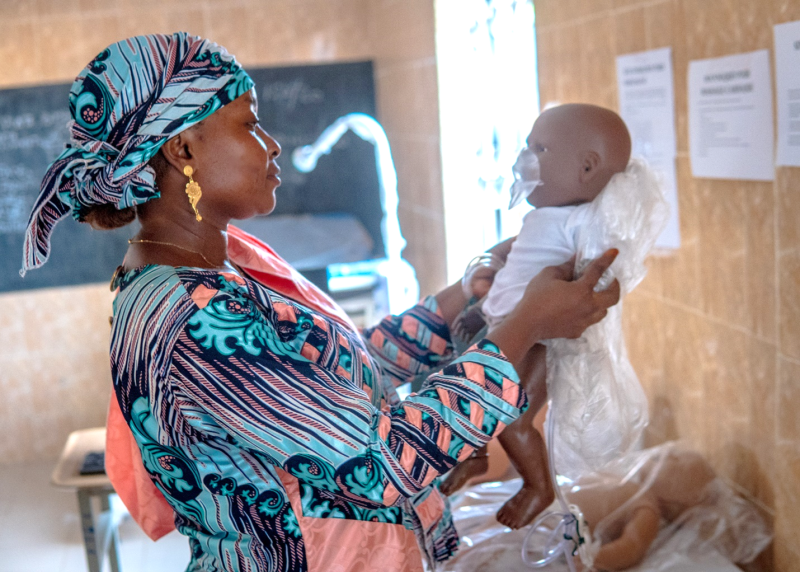
Marguerite Diarra, midwife and teacher at Vicenta Maria School in Ségou, Mali, unpacks the equipment for the school's new competence laboratory. Photo by Amadou Iam Diallo for IntraHealth International.
The Classroom to Care project's investments lay the foundation for a more resilient health workforce, ready to meet maternal and newborn health challenges.
Lire en français.
It’s almost 4 p.m. on June 6, 2024, and satisfaction fills the air at Vicenta Maria School in Ségou, Mali. There is a collective sense of pride in the inauguration of a brand-new skills lab at the institution. A final ceremony concludes a long but rewarding process to enhance the quality of training for health students, particularly those in nursing and midwifery. It’s the culmination of months of dedicated efforts by the Classroom to Care (C2C) project, including previous ceremonies for the delivery of educational materials in Senegal at the "Monseigneur NDIONE" Nursing School (EIID) in Thiès; in Dosso, Niger at the School for Health Agents (EFAS); and now in Mali.
“The students can now directly apply the techniques taught on simulation mannequins, essential for future midwives and nurses."
Here we reconnect with Marguerite Diarra, a midwife and full-time teacher at Vicenta Maria, who expresses her satisfaction with working in the new skills lab. "The acquisition of this lab will greatly help us, especially in the application of the Competency-Based Approach,” she says. “The students can now directly apply the techniques taught on simulation mannequins, which is essential for future midwives and nurses."
A public-private partnership, the C2C project combines the technical expertise of IntraHealth International with the financial resources of Takeda Pharmaceutical Company, enabling the implementation of sustainable solutions for local health systems. This initiative’s success relies on the strong support of the ministries of health and higher education in the three countries. The C2C team also worked closely with health school associations, quality assurance agencies, and regional organizations to ensure the effective implementation of the project’s activities.
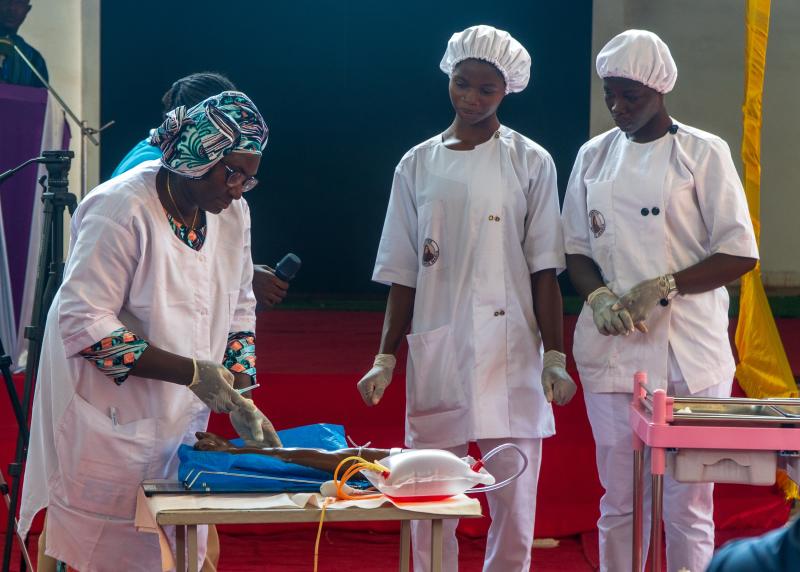
During the donation ceremony at Vicenta Maria School in Ségou, Mali, a teacher demonstrates how to use the new equipment. Photo by Amadou Iam Diallo for IntraHealth International.
In West Africa, the training of nurses and midwives faces numerous challenges. The lack of educational materials is one of the most pressing. Students, often confronted with insufficient clinical demonstration equipment, struggle to acquire essential practical skills before they must work with real patients.
“Before, our students severely lacked resources to train effectively.”
"Before the arrival of the new equipment, our students severely lacked resources to train effectively,” says Ousseini Moussa Abderhamane, Director General of the School for Health Agents (EFAS) in Dosso, Niger. “This absence of equipment limited their preparation and made learning difficult. They often felt anxious about entering practical internships without having had the opportunity to practice in realistic conditions. This was reflected in their performance during internships, where they lacked confidence and competence. With the old equipment, it was impossible to cover all the necessary skills, which left a gap between the theory taught and the practice in the field."
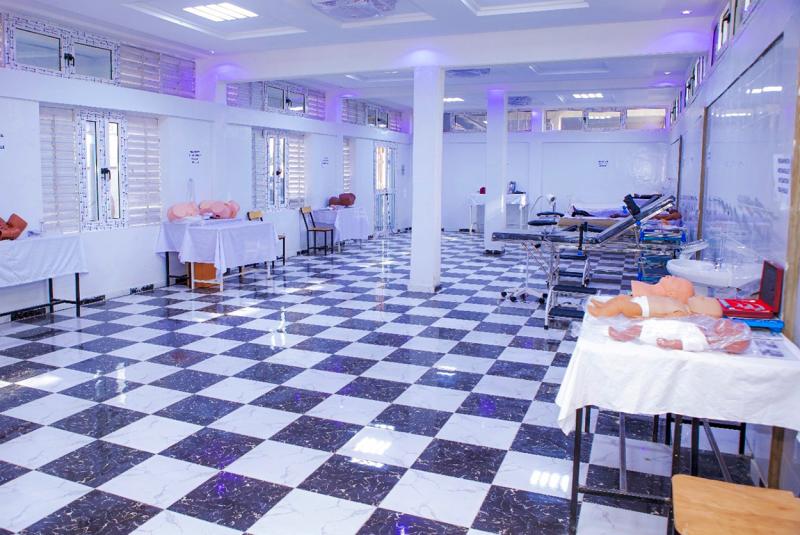
New skills labs, like this one at the School of Training of Health Workers (EFAS) in Niger offer a practical learning environment. Photo by Dimension Red Agency for IntraHealth International.
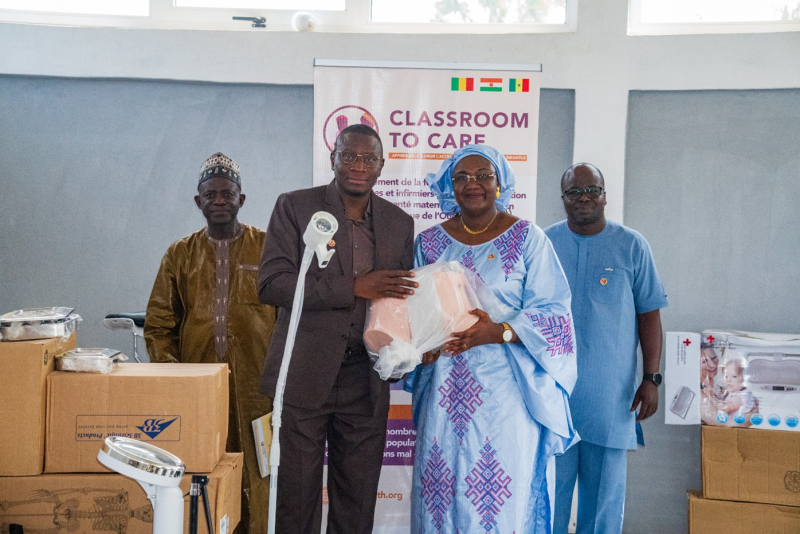
Abderhamane Goumey, communication officer at EFAS and Ousseini Moussa Abderhamane, director general of EFAS receive teaching materials from Jeanne Tessougué, director of C2C and Moïse Gabriel, pedagogical advisor for C2C. Photo by Amadou Iam Diallo for IntraHealth International.
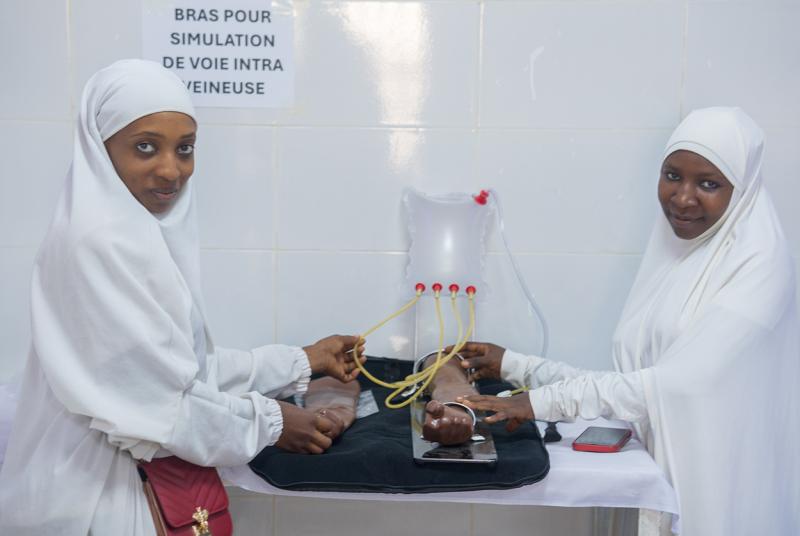
Students at EFAS will use the new equipment to develop and refine their clinical skills before caring for real patients. Photo by Amadou Iam Diallo for IntraHealth International.
Statistics highlight the urgent need for improved training and infrastructure for nurses and midwives. In Mali, maternal and infant mortality rates remain among the highest in the region, with a neonatal mortality rate of 334 per 10,000 live births, partly due to inadequate training and a shortage of health professionals in rural areas. Similarly, in Niger, the neonatal mortality rate is 250 per 10,000 live births, and in Senegal, it is 290 per 10,000.
Statistics highlight the urgent need for improved training and infrastructure for nurses and midwives.
The C2C project aims to provide health training institutions with the necessary resources to ensure high-quality practical training, focused on the Competency-Based Approach. An essential component is the creation of skills labs, the provision of modern educational materials, and the adaptation of curricula to local needs. These efforts have been supported by a substantial investment of 120 million CFA francs (~ $202,700) for each of the three countries, enabling the acquisition of various essential equipment, including simulation mannequins for childbirth, obstetric examination tables, neonatal resuscitation equipment, as well as computers and projectors. The direct beneficiaries include 12 private schools and 9 public health schools.
Awa Fall Diagne, the former Director of Human Resources at the Ministry of Health and Social Action of Senegal, emphasizes the importance of this donation of educational materials. "The Ministry of Health greatly appreciates this donation, which will positively impact the provision of maternal and neonatal health care,” she says. “This donation truly helps to elevate the quality of training, so that the graduates from these schools can serve optimally in health facilities."
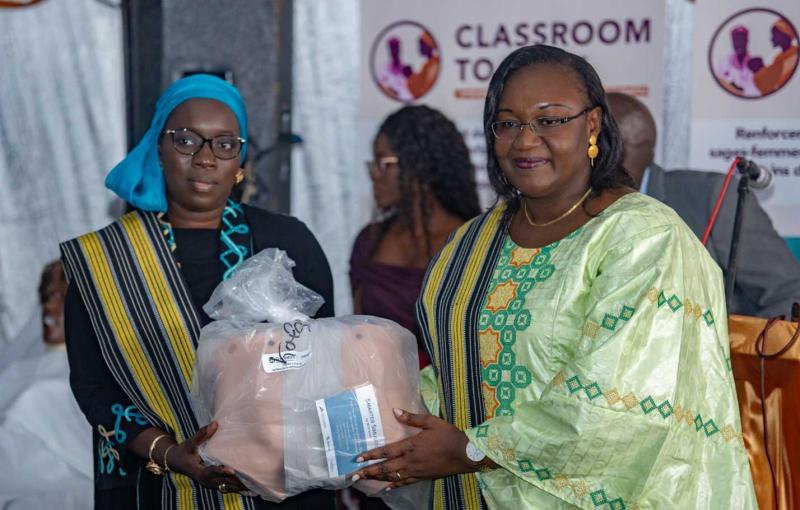
Awa Fall Diagne (left), director of human resources at the Ministry of Health and Social Action of Senegal receives educational material from Jeanne Tessougué (right), C2C's director. Photo by Amadou Iam Diallo for IntraHealth International.
The skills labs are central to the project, providing a practical environment for students to develop clinical skills in a controlled setting before working with real patients. These labs help ensure that future professionals are ready for the challenges of maternal and infant health. Participating institutions also receive ongoing support through clinical supervisor training and curriculum updates, ensuring that teaching methods stay aligned with the latest health care advancements.
"In nine years, this is the first time we have received this type of state-of-the-art equipment," says Ousseini. "It allows us to better explain, monitor, and teach our students how to provide quality care. As the saying goes, never on a real patient the first time, so we teach them to practice first on mannequins."
The schools encourage students to practice regularly in the newly equipped skills labs, where they have access to simulators that recreate realistic clinical scenarios in an immersive and secure learning environment. This training method allows them to become familiar with the technical skills necessary for their future profession, bridging the gap between theory and practice.
We can practice several types of nursing techniques here.
Minty Keita, a state nurse and permanent instructor at Vicenta Maria, cannot contain her excitement about how the new equipment will help improve the training of nurses, and health care for all Malians. "Finally, we have our skills lab,” she says. “Here we have a bisexed mannequin named Suzie Simone. It has the ability to be either male or female. It will allow us to [learn how to] perform clinical exams and care for a hospitalized or bedridden patient. We can practice several types of nursing techniques here, such as suprapubic puncture, urinary catheterization, or even dressing wounds."
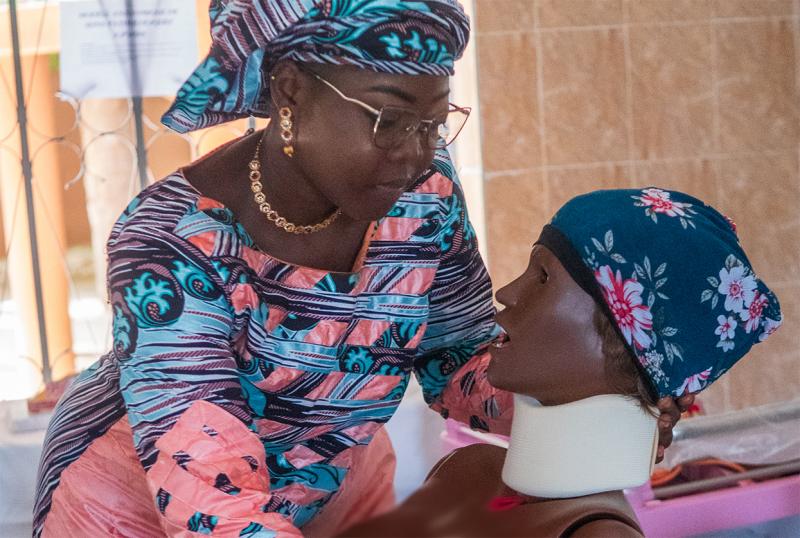
Minty Keita, a nurse and instructor at Vicenta Maria, demonstrates clinical nursing care using the Suzie Simone simulator. Photo by Amadou Iam Diallo for IntraHealth International.
In addition to the physical equipment, C2C is also investing in the development of eLearning platforms, which will offer students flexible access to online educational resources and promote distance learning and self-training. Trainers will be able to use these platforms to track students' progress and adapt educational content to specific needs.
C2C is also investing in the development of eLearning platforms and emphasizes DEI.
Moreover, C2C emphasizes equity, diversity, and inclusion (EDI) in the implementation of its initiatives, and conducted a thorough EDI situational analysis to identify the specific challenges faced by the most vulnerable populations, such as disabled women, students from disadvantaged backgrounds or living in remote areas, as well as pregnant and nursing women. Dissemination workshops are underway with partner institutions to ensure that these considerations are integrated into governance policies, training programs, and infrastructure. For instance, baby-mother spaces will be provided to allow pregnant or nursing students to continue their education under favorable conditions, thus promoting their inclusion and academic success.
Through its innovative approaches and substantial investments, the Classroom to Care project is helping to lay the foundation for more resilient health systems in West Africa, better equipped to meet the challenges of maternal and infant health.
Get the latest updates from the blog and eNews




